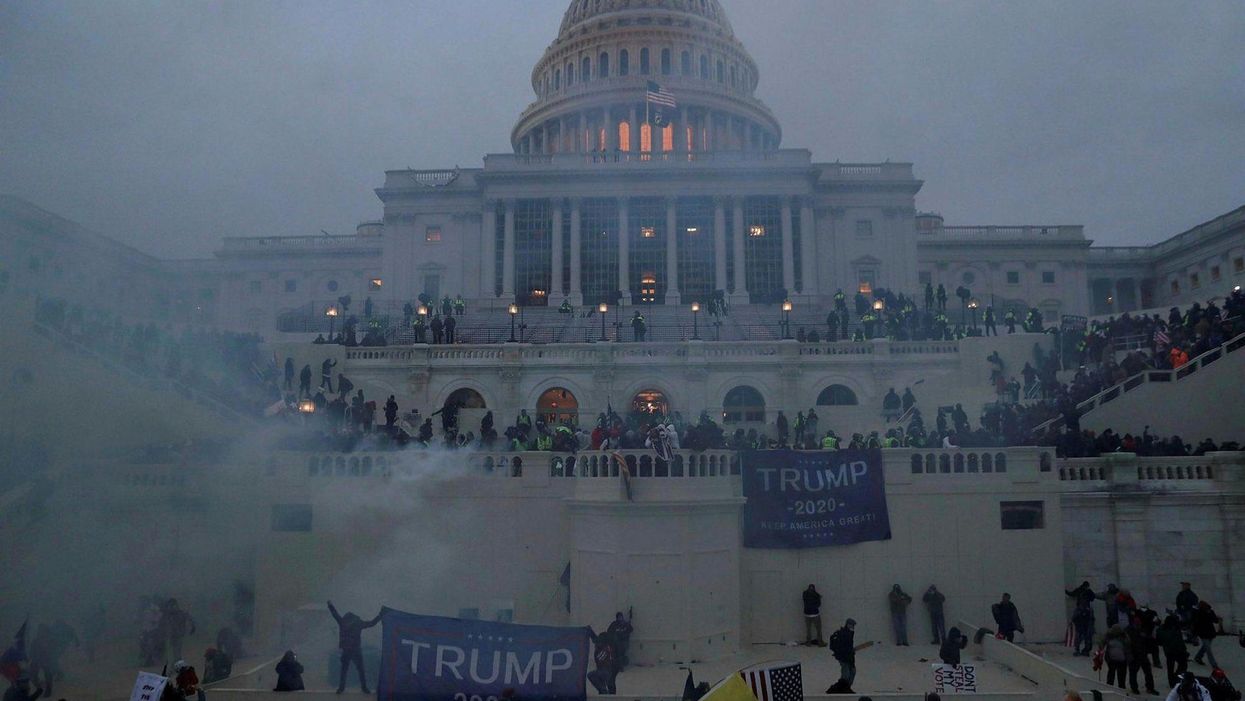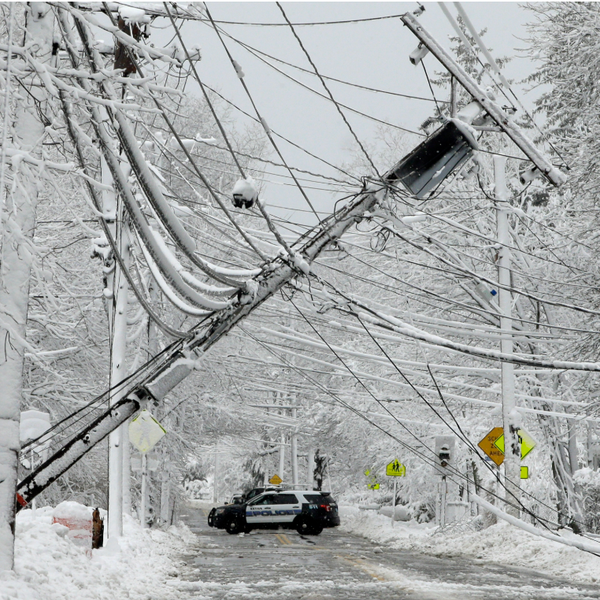
The Lies That Drove Trump's Mob Still Linger
This article was produced by Voting Booth, a project of the Independent Media Institute.
Eight days ago, allegations of illegal and fraudulent voting in Pennsylvania and other swing states where President Trump lost led his supporters to storm the Capitol. The mob came after a Trump rally, where the president recited numerous falsehoods that long have been debunked.
It was a stunning spectacle. More than a dozen Republican congressmen rose and condemned the violence. Then, as if the cause of the rampage lay elsewhere, they opposed certifying Pennsylvania's votes by reciting many of the same allegations that Trump uttered that day—atop innuendo that Democrats had widely cheated.
"To sum it up, Pennsylvania officials illegally did three things," said Rep. Ted Budd (R-NC). "One, they radically expanded vote by mail for virtually any reason. Two, they removed restrictions when a ballot could be sent in. And three, they removed signature verification on those very ballots."
Budd did not mention that Pennsylvania's Republican majority legislature had approved the election reforms that laid the ground rules for 2020's election. Nor did he note that the Republican National Committee had pushed Pennsylvania's Republicans to vote with absentee ballots—and hundreds of thousands did.
Instead, Budd and other Republicans said that the election was illegitimate because Democratic officials—such as Pennsylvania's secretary of state—issued rules to make it easier for voters and election officials to manage in a pandemic. They said the Constitution had been violated because the Pennsylvania Supreme Court had agreed with those steps. Only state legislatures could set election rules, they said, making a novel argument that ignored decades of election law and court rulings.
"I rise in support of this objection and to give voice to the 249,386 men and women of Ohio's 6th Congressional District," said Rep. Bill Johnson, R-OH, "who have had their voices silenced by the rogue political actors in Pennsylvania, who unilaterally and unconstitutionally altered voting methods to benefit the Democratic candidate for president."
"Secretaries of state and state supreme courts cannot simply ignore the rules governing elections set forth in the [U.S.] Constitution," he fumed. "They cannot choose to usurp their state legislatures to achieve a partisan end, Constitution be damned."
These representatives were joined by others who said that Trump's mob was "shameful," "unacceptable" and "un-American." Yet they went on to recite many of the same claims that Trump made before his mob acted. These claims filled the 60-plus lawsuits brought by Trump and his allies since the election—claims federal and state judges have overwhelmingly rejected as baseless and lacking in evidence.
Had these Republicans learned anything from the rampage? When the debate ended well past midnight, 138 Republicans voted to reject Pennsylvania's 20 Electoral College votes. Their dissents did not stop the chamber from accepting the state's Electoral College votes. Nor did it prevent a joint session of Congress later that morning from certifying Joe Biden and Kamala Harris as the 2020 election's winners.
Yet the 138 votes, and the slippery arguments or misrepresentations that preceded them, are a dark sign of the times. When one-quarter of House members either lack sufficient knowledge of how elections are run or cling to specious arguments to overturn results, the undercurrents driving Trump's mob are still present. Looking ahead, voting rights advocates are starting to see these sentiments resurface as a new wave of anti-voting legislation in red-run state legislatures.
"We're deeply concerned the post-election lawsuits are now morphing into state-driven voter suppression schemes," said Kristen Clarke, president of the Lawyers' Committee for Civil Rights Under Law, speaking during a press briefing during Georgia's runoffs on January 5. "These lawsuits failed universally… Now we see lawmakers seeking to exploit this moment [and] institute new restrictions on measures such as [repealing] no-excuse absentee voting."
Clarke is partly referring to a proposal by Georgia's Republican Secretary of State Brad Raffensperger to reel in absentee voting. The 2020 election had overwhelmed local election officials, he has said, adding that future voting options needed to be streamlined. Record numbers of Georgians voted by mailed-out ballots in 2020, which was part of the wave that elected two Democratic U.S. senators and delivered a surprising Biden-Harris victory.
Raffensperger had been attacked by Trump as a RINO—Republican In Name Only—and pressured by Trump on January 2 to alter the certified vote count so Trump would emerge as the victor. On Thursday, the Trump campaign withdrew its suits in Georgia on the eve of scheduled court hearings. Raffensperger issued a detailed press release that noted Trump folded just before his legal team had to present evidence of illegal voting and rigged elections.
"On the eve of getting the day in court they supposedly were begging for, President Trump and [Georgia Republican Party] Chairman David Shafer's legal team folded Thursday and voluntarily dismissed their election contests against Secretary of State Brad Raffensperger rather than submit their evidence to a court and to cross-examination," the secretary's release began.
"However, even in capitulation, they continue to spread disinformation," it said. "The President's legal team falsely characterizes the dismissal of their lawsuits as 'due to an out of court settlement agreement.' However, correspondence sent to Trump's legal team prior to the dismissals makes perfectly clear that there is no settlement agreement. The Trump legal [team] voluntarily dismissed their lawsuits rather than presenting their evidence in court in a trial scheduled for tomorrow in front of Cobb County Superior Court Judge Adele Grubbs."
The statement said that the "withdrawals came after Secretary Raffensperger sent a letter to Congress on Wednesday containing point-by-point refutation of the false claims made by the President and his allies. Late last night, Congress accepted Georgia's slate of electors without objection, as no Senator joined in [Republican] Congressman Jody Hice's objection to Georgia's electors."
Few Republicans probably read Raffensperger's memo as they sought shelter from Trump's mob. However, in the other chamber, Georgia's Sen. Kelly Loeffler, who lost to Democrat Rev. Raphael Warnock a day before, said she could no longer oppose her state's certification of the presidential vote. The storming of the Capitol had changed her mind. The same could not be said of nearly one-third of the House.
Steven Rosenfeld is the editor and chief correspondent of Voting Booth, a project of the Independent Media Institute. He has reported for National Public Radio, Marketplace, and Christian Science Monitor Radio, as well as a wide range of progressive publications including Salon, AlterNet, The American Prospect, and many others.
- The Trump Republicans And The Fuhrerprinzip - National Memo ›
- Before His Mob Stormed Capitol, Trump Participated In Security ... ›
- Right-Wing Websites Revealed Plans For Washington Violence ... ›
- Right-Wing Websites Revealed Plans For Washington Violence ›
- More Republican Legislators Linked To Violent Assault On Capitol ... ›
- Danziger Draws - National Memo ›
- Palm Beach D.A. Says Trump Faces Criminal Jeopardy In Election Fraud - National Memo ›
- WATCH: Did Trump’s Lawyer Purloin Senate Coasters After Verdict? - National Memo ›
- Big Trump Donor Demands $2.5 Million Refund Over Failed Election Challenge - National Memo ›
- Trump Lost the 2020 Election. He Has Raised $207.5 Million Since ... ›
- Trump Is Lying More Than Ever: Just Look At The Data ›
- Fox News Lets Trump Spew Lies Unchecked In First Interview Since ... ›
- Fox News' Maria Bartiromo gave Trump his first TV interview since ... ›
- As chaos erupts at Capitol, officials lambaste Trump for rhetoric that ... ›
- Election Officials Blame Trump's Rhetoric For Stoking Violence ... ›
- Incitement: a timeline of Trump's inflammatory rhetoric before the ... ›
- Trump's history of inciting violence in words and tweets: A timeline ... ›








